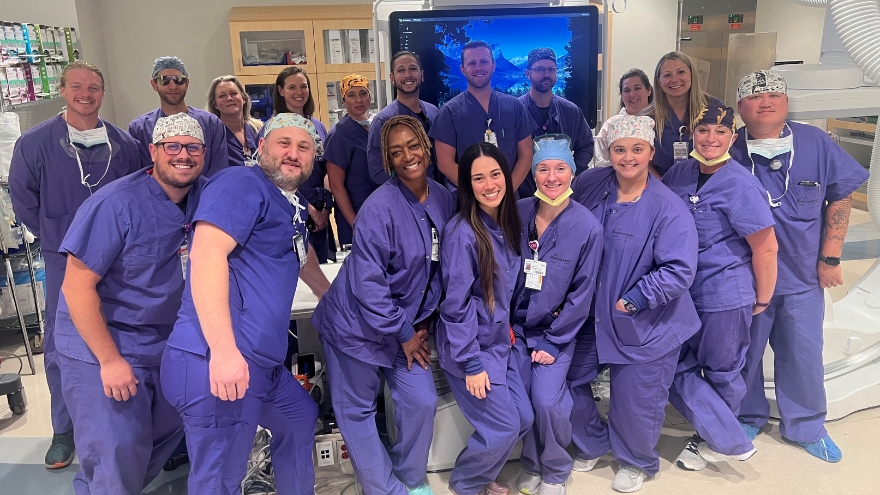Search
Results for 'clinic'
Clear-
Physiatry NEURO-REHABILITATION CLINIC
What is Physiatry? Physiatry (fuh·zee·a·tree) encompasses the diagnosis, prevention and treatment of all disabilities related to the brain, nerves, bones and muscles. The goal is to maximize physical functioning, significantly decrease or eliminate pain, foster independence and improve the quality of life for those with a disability, chronic pain and physical impairments.
-
Spine, Sports and Pain Management
How We Can Help You may benefit from treatment for neuromuscular (nerve, muscle and bone) disorders – that cause pain and impair normal functions. But, first, consult your primary care physician for a referral to Renown Health's Spine, Sport & Pain Management. Dr. Keating, Medical Director and his colleagues, Dr. Su and Dr. Storm, will customize a treatment plan that best suits your needs and lifestyle while providing the most effective care possible. For more information: Call 775-982-3608 | Fax 775-982-8001
-
When Is It Time to See a Physiatrist
Physiatry (fi-zahy-uh-tree), also referred to as physical medicine and rehabilitation, encompasses the diagnosis, prevention and treatment of disabilities or injuries related to the brain, nerves, bones and muscles. The goal of this specialty is to maximize physical functioning, greatly decrease or eliminate pain, foster independence and improve quality of life for those suffering with a disability, chronic pain and physical impairments. Who Is It for? Physiatry can help patients with functional deficits and secondary medical conditions as a result of the following: Amputation Brain Injury Osteoarthritis Spasticity and Movement Disorders Spinal Cord Injury Spine Pain Sports-Related Injuries Stroke Some of these medical conditions can often cause chronic pain or impede physical functioning, ultimately affecting a person’s overall well-being and making it difficult for them to sustain a desired quality of life.
-
Know Before You Go
Grab your skis, goggles, coat – and don’t forget that helmet. Skiing and snowboarding are fun activities for all ages but come with the risk of injury. Read on for tips to make it a safe day on the mountain. Daydreaming about your next trip to the slopes? We talked to Jared Worchel, DO, about his top tips for gearing up. Get the Gear Before you head out to ski or snowboard, make sure you have all your gear ready and in good condition. Everything should fit correctly so that it keeps you as safe as possible. Wearing proper gear will also help keep you warm. Items to check on before you head out include: Boots Bindings Goggles Poles Helmet Outwear Gloves Pack water and snacks in case the drive takes longer than you except due to weather or traffic. You’ll also want to make sure that your cell phone is fully charged before you head out in case you need to contact friends of staff for help while on the mountain. Helmet, Helmet, Helmet Having a helmet that fits correctly is the most important thing you can do to prepare for a safe day on the mountain. According to a National Ski Areas Association study, helmet use has increased over the last 15 years, with 80 percent of skiers and snowboarders using helmets. Schubert would like to see that number increase to 100 percent. “If you have a head injury it could take you out for the rest of your life,” Dr. Worchel said. “The most important things to think about when fitting a helmet are making sure that it really fits you appropriately. You want to go into a store and try on as many different helmets as they have available. I know it’s tempting to buy one online, but you’re never going to know if it fits correctly.” If you are in an accident, your helmet’s fit can help protect you. Dr. Worchel has some tips on fitting: A helmet should fit low and snug over the head. Make sure that the helmet doesn’t wiggle or feel loose. Look for a model that has adjustability in the back, which will help you make sure it fits snugly. F ind a helmet with a chin strap that will help it stay in place throughout the day.
-
Department Spotlight: Interventional Radiology
National Radiologic Technology Week is from Nov. 5-11, 2023. Join us in celebrating Renown's Interventional Radiology department!Try to put yourself in the shoes of someone who is told that they have a massive blood clot in their lung, someone who needs a biopsy to determine the next steps of their care, someone facing a stroke or brain aneurysm or someone who needs a catheter to receive treatment such as chemotherapy. You may immediately think that an intense and intimidating surgery is on the horizon. What if, instead of surgery, your care teams were able to use the necessary tools to treat your blockage or administer your medicine with an image-guided procedure? That’s precisely what the Interventional Radiology (IR) team at Renown Health does. Behind the doors of this department is where you’ll find a team of highly skilled individuals who operate like a well-oiled machine, ensuring that each procedure is executed with precision and care. Their commitment to excellence knows no bounds as they provide essential interventions to patients of all ages, from the tiniest newborns to the elderly. Their mission extends beyond diagnostic and therapeutic procedures; they are experts in understanding and serving the ever-evolving needs of their patients. Minimally Invasive, Maximally Impactful With their advanced expertise, our IR teams at both Renown Regional Medical Center and Renown South Meadows Medical Center harness the power of X-ray, CT and ultrasound technologies to navigate their way through life-saving minimally invasive procedures, such as thrombectomies, angioplasties, stent placements, embolizations, catheter and drain insertions and needle biopsies. In the world of medicine, Interventional Radiology often offers an alternative to traditional surgical methods, reducing the risk of hospitalization and helping patients embrace recovery more quickly. Our IR teams have a diverse and busy daily work life in order to make these complex and life-saving interventions happen – and they all have each other’s backs to ensure that every patient gets the care they deserve. “Every day is different, and no two days are alike,” said Ryan Nunes, Specialty Procedure IR Technologist at Renown Regional. “The day can start off first thing in the morning with several emergent cases, such as ruptured brain aneurysms to brain blockages. We all work really well together; we help each other out and come together to do things as a team.” Like every other team at Renown, patient well-being is always a number one priority. The IR department takes this commitment seriously, upholding the highest standards of ethics and safety. “We start the day by preparing rooms and making sure they are well-stocked, checking that all devices are working, performing safety checks and making sure the entire team is well-prepared for whatever cases come through the door,” said Aubrey Goldsmith, Supervisor of Clinical Nursing in IR at Renown Regional. “We have routine cases like drain placements, biopsies, line placements and more, and we also have life-threatening cases that come at a moment’s notice. Our nurses are responsible for monitoring patients throughout the procedure to make sure they are doing well the entire time and are there to respond if the patient has a decline.” "After completing the prior assessment of each patient, we look for any medical problems the patient may have before confirming it is safe for the patient to have procedure done,” said Brandon Hartwig, Interventional Radiology RN at Renown South Meadows. “We work closely with the physicians on all our cases while assessing each patient, going through labs and vitals and personalizing the procedure for each patient.” Even though the procedures they oversee are minimally invasive, the IR team understands that any procedure, regardless of the severity, can be incredibly frightening for any patient. Their best tool for handling patient anxieties? Communication. "The best thing we can do to reduce anxieties and fears in patients is to have communication with them to ensure they know what is going on and what to expect,” said Megan Rios, IR Technologist at Renown Regional. "We set clear expectations for the patients and give reassurance throughout the entire procedure.” "All of our team members are very attentive to our patients when it comes to potential fears and anxieties that they may have,” added Jazmynn Kimsey, IR Technologist at Renown Regional. “We always take the extra time to listen to our patients and break things down, explaining every step before, during and after the procedure.” Knowledge sharing is also a crucial part of the IR process. No patient will ever have to wonder, “what exactly is going on here?” “We provide each patient with education and advocacy throughout the process,” said Blaire Henderson, Interventional Radiology RN at Renown Regional. “We ensure every patient is as comfortable as possible at all times.” “When it comes to procedures, patients tend to be scared and nervous,” added Ryan Nunes. “The silver lining to what we do is that it is all done through very small openings of the skin, and we all explain this to patients. Most procedures we do are done under moderate sedation which helps put the patient more at ease.” In a world where advanced medical care meets the human touch, the IR team exemplifies Renown’s commitment to making a genuine difference in the health and well-being of everyone they serve.
Read More About Department Spotlight: Interventional Radiology




